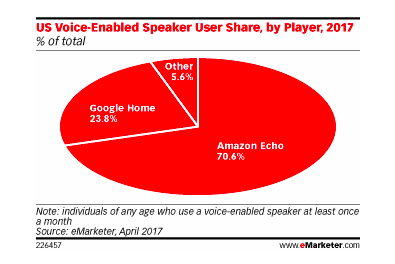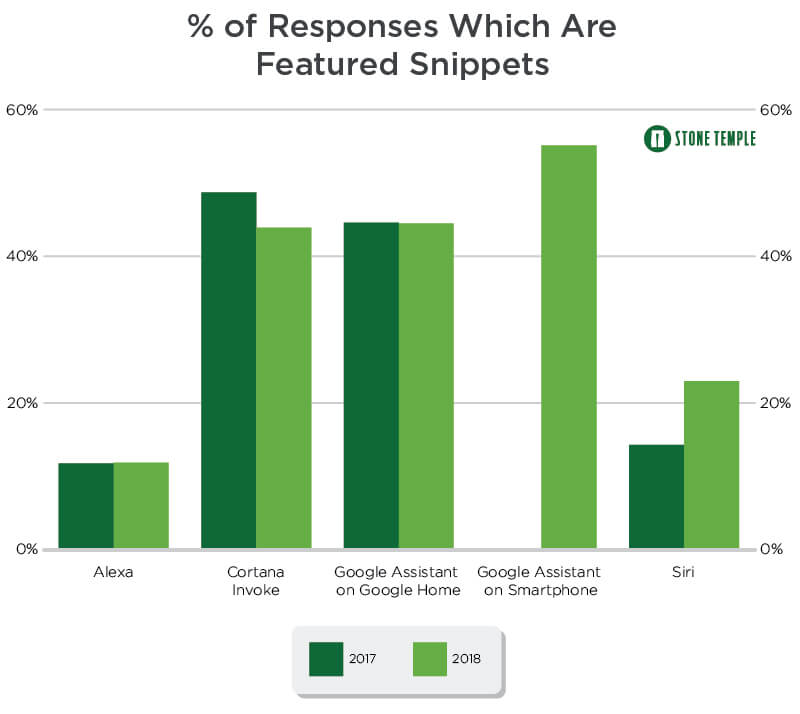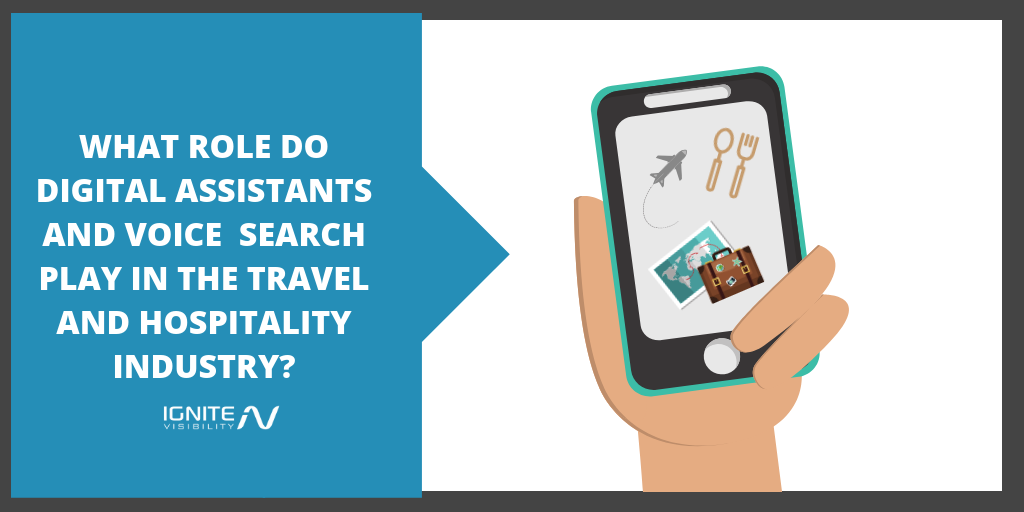Wondering how voice search may affect the travel industry?
You’re not alone.
The introduction and ensuing popularity of digital assistants has brought with it a change in the way we search and market businesses.
In this article, I’ll explain the changing role voice search plays in the hospitality industry, and how you can prepare for the new technology.
The popularity of voice search has been on the rise for some time now, with no signs of slowing down.
As of January 2018, there were an estimated 1 billion voice searches per month. And by 2020, it’s predicted that 50% of searches will be done by voice.
Part of the upswing can be attributed to the easy accessibility of digital assistants – they live in our phones, our cars, our watches, living rooms, and kitchens.
Most communicate in multiple formats, whether it’s through a home device like Google Home or a wearable watch like Apple’s Siri.

Voice search and hospitality: US speaker share
Because of that, searching’s never been easier.
Users no longer need to fire up Google on their laptops or type a query into a mobile device. And why would they, when they can plan their next vacation during their daily commute?
Studies show travelers may be doing just that.
According to Microsoft, travelers in Great Britain are researching accommodations via voice search at an increasing rate, with hotel searches seeing an increase of 343% year-over-year and flight searches increasing by 277%.
And the truth is, it makes sense.
For someone making last-minute travel plans, the ability to speak directly to a personal assistant and receive an answer – rather than scroll through a page of results – lets that user easily find a hotel, inquire about rooms, pricing, dates, etc. in a single conversation.
Or, someone who finds themselves lost in a new city might need quick access to directions, or an easy way to find a phone number while they wrangle their suitcases.
A voice assistant eliminates any hassle or lag time from the usual search process, making it ideal for these – and many other – situations faced by travelers.
But while it presents opportunities for travelers, it presents a few new challenges for those in the travel industry.
What Voice Search and Digital Assistants Mean for Hospitality
If those in the travel industry want to remain relevant, they’ll have to embrace the changing focus in search and SEO.
And the changes will be greater than you think.
For one, hotels will have to accept digital assistants as an industry.
That means factoring in possible added costs associated with inclusion in voice search results and additional fees for booking.
These pay-to-play policies could also have an effect on smaller travel agencies and firms trying to compete with the bigger names in the business, and many worry they could be priced out.
Chief data officer in AccorHotels group Fabrice Otano has said, “What we don’t know is how much we have to pay to be referenced by Google Home. If Booking.com invents a new voice assistant and will pay three billion to be referenced, it’s the same battle as today but on a different channel.”
It also means looking at how digital assistants could affect day-to-day operations.
Recently, Amazon launched Alexa for Hospitality, a program that lets Amazon Echos act as in-room concierges to hotel guests.
These Alexa-enabled rooms allow guests to find information on nearby dining, activities, and request hotel amenities and services through voice.
The new program was tested in a few hotels initially, and in a survey of guests that stayed in these rooms more than 70% said that when booking hotels in the future, they would choose Alexa-enabled rooms if available.
For most hotels, that means they may have to ready to install new technology if they wish to remain relevant.
On that note, remaining relevant also extends to how the hospitality industry approaches search results and SEO.
Hotels and travel sites have long relied on search for business. Save for some well-known brand names like Airbnb, most depend on search for the majority of website traffic.
As we know, to be found in search requires a strong SEO and content strategy.
But thanks to voice search, what we know about SEO has changed. And to continue to stay relevant, the hospitality industry will have to change the way they approach SEO.
How Voice Search Impacts SEO
Users interact very differently with voice than they do with text searches.
With text, it’s all keyword focused.
Unnecessary words are removed, and grammar generally isn’t accounted for.
For example, “best tacos Austin”: good search query, bad sentence.
But recently, and especially with the introduction of voice, queries have become much longer and conversational.
Instead of typing in “best tacos Austin” a voice searcher would ask “Where can I find the best tacos in Austin?”
Or, instead of “cheap flights from San Diego to Thailand,” they might request: “I need a list of the cheapest flights from San Diego to Thailand.”
Because of the shift, search engines have been relying less on keywords and more on Natural Language Processing to inform their search results.
For anyone unfamiliar, Natural Language Processing is artificial intelligence (AI) that helps computers understand and interpret human language.
So, what does this mean for hospitality marketers?
It means adopting a strategy that adheres to the growing conversational tone, is optimized for longer search queries, and is ready to provide quick responses to anticipated search queries.
Here’s how businesses in the travel and hospitality industry can stay ahead.
Optimize for Conversation and Question Phrases
With voice search, your traditional keyword search is thrown out the door.
As we’ve covered, people just don’t search the same.
In fact, search is dominated by question phrases – those that use who, what, when, and where.
All this means that digging into keyword reports in Google Keyword Planner or SEMRush won’t typically return the kinds of phrases people are using when they use voice and digital assistants.
Instead, you need to do a little work on your own to anticipate the kinds of questions a user might ask about your hotel, airline, or travel destination.
A tool like Answer the Public can help.
When you launch the site and type in a keyword, it will return a huge of list of questions being asked with that keyword.
These are the kinds of questions users are asking in regards to your business, and they’re the questions you need to be optimizing your content around.

Voice search and hospitality: 41% talk to speaker’s as if they’re speaking to another person. Image courtesy of Wordstream
For reference, when choosing keyword and question phrases keep in mind that people are likely to:
- Use natural language
- Less likely to use keywords
- More conversational searches
- Use longer search queries
There is some speculation that Google will soon be adding voice search filters to its analytics reports, but no timeframe or final decision has been given by Google.
Optimize for Local SEO
Local search questions dominate voice search.
In fact, in 2016 the Internet Trends Report found that 22% of voice searches were used to find local content and information.
Though local users don’t typically make up the tourism industry’s target audience, local SEO has a lot to do with how search engines like Google prioritize your business.
That means you’ll want to claim and thoroughly fill out your Google My Business and other online directory profiles with updated, consistent information.
Think about it. As a traveler drives around in their voice-enabled rental car, they’ll likely be saying “I need directions to (insert hotel),” or, “what is the (insert hotel) phone number?”
Google needs to be able to return that information ASAP, so make sure you’ve given it to them.
It also means incorporating keywords that take local landmarks and neighborhood description into account.
Because people will be asking Google or Apple where they can find “hotels in the hipster neighborhood,” “with a view of the Vegas strip,” or “restaurants near local music venues,” and if any of those are you (not to mention the countless other descriptors) you need to claim it in your content so Google can find it.
Optimize for Featured Snippets and Quick Answers
When users search by voice, they’re usually looking for instant answers.
Rather than clicking on a search result and searching through your content, they want Google to return the most relevant answer instantly.
So that’s what Google does.
We call these instant answers featured snippets.
In the search results, featured snippets appear at the very top of the SERPs (often referred to as position 0). Usually indicated by a box, these snippets feature answers to a particular search query.
Because they feature quick answers, featured snippets are often used in voice search results.
According to research by Stone Temple, the amount of voice searches that return featured snippets varies by device.

Voice Search and hospitality: focus on featured snippets
Google Assistant on Smartphone returned almost 60% featured snippet responses, while Alexa and Siri came in last with about 15% and 20%, respectively.
Still, the numbers don’t lie: featured snippets play a big part in digital assistant search.
For the best chance at claiming at a spot in position 0, marketers need to again be optimizing their content for questions.
For reference, try to use content with the following in mind:
- Answer questions revolving around your target keyword
- Answers should be brief or in list form
- Questions should be in H2 (your subheadings)
- Target pages that are already ranking on page 1 of the SERPs
When in doubt, rely on the jeopardy principle. That means putting your keywords in the form of a question.
So if one of your major selling points is “eco-friendly hotel in Bali,” change it to “What are eco-friendly hotels in Bali,” make it an H2, and feature your hotel in a short, concise answer.
Another way to this is through FAQs.
Creating an FAQ section on important pages is a great way to collect all relevant questions in one easy-to-find place.
Bonus: it makes it even easier for Google to pull relevant questions and answers for search queries.
It also gives you the opportunity to present your content in a concise manner – perfect for featured snippets and voice results.
One of Google’s Voice Quality Raters criteria is the length or the results. Anything too long will receive a low grade.
While Google doesn’t give exact word counts regarding what too long means, a study by Backlinko found that the average voice search response consisted of just 29 words.
Wrapping Up Voice Search and the Hospitality Industry
The full effects of voice search and digital assistants remain to be seen.
For now, we know they’ll continue to play a role in guest’s booking and overall experience, and those in the industry should start looking at ways to increase their visibility when it comes to voice.
It also seems likely that traditional search will remain a key component in hospitality.
Travel, in general, relies heavily on images to convey an experience, and it stands to reason that users will still turn to websites and image searches in their decision-making process.
Either way, voice search isn’t going anywhere. It’s time we all prepared for it.
